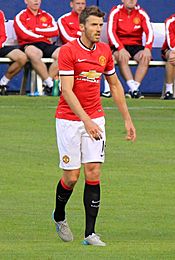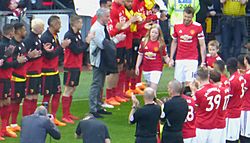Michael Carrick facts for kids
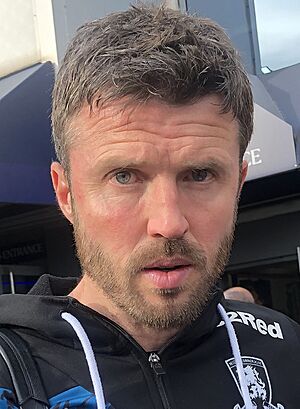
Carrick as head coach of Middlesbrough in 2025
|
|||
| Personal information | |||
|---|---|---|---|
| Full name | Michael Carrick | ||
| Date of birth | 28 July 1981 | ||
| Place of birth | Wallsend, Tyne and Wear, England | ||
| Height | 6 ft 2 in (1.88 m) | ||
| Position(s) | Defensive midfielder | ||
| Team information | |||
|
Current team
|
Manchester United (head coach) | ||
| Youth career | |||
| 1986–1997 | Wallsend Boys Club | ||
| 1997–1999 | West Ham United | ||
| Senior career* | |||
| Years | Team | Apps | (Gls) |
| 1999–2004 | West Ham United | 136 | (6) |
| 1999 | → Swindon Town (loan) | 6 | (2) |
| 2000 | → Birmingham City (loan) | 2 | (0) |
| 2004–2006 | Tottenham Hotspur | 64 | (2) |
| 2006–2018 | Manchester United | 316 | (17) |
| Total | 524 | (27) | |
| International career | |||
| England U18 | 4 | (0) | |
| 2000–2003 | England U21 | 14 | (2) |
| 2006 | England B | 1 | (0) |
| 2001–2015 | England | 34 | (0) |
| Managerial career | |||
| 2021 | Manchester United (caretaker) | ||
| 2022–2025 | Middlesbrough | ||
| 2026– | Manchester United | ||
| *Club domestic league appearances and goals | |||
Michael Carrick, born on July 28, 1981, is an English professional football coach and former player. He is currently the head coach of the Premier League club Manchester United. Carrick is famous for his amazing 12-year playing career with Manchester United, where he also served as captain.
He played as a defensive midfielder, a position where he helped protect his team's defense. Sometimes, he even played as an emergency centre-back when needed. Carrick's playing style was special because of his excellent passing skills and ability to control the game.
Carrick started his football journey at West Ham United, joining their youth team in 1997. He helped them win the FA Youth Cup two years later. During his first season, he went on loan to Swindon Town and Birmingham City. He then became a regular player for West Ham by the 2000–01 season. After making over 150 appearances for West Ham, he moved to Tottenham Hotspur in 2004. In 2006, he joined Manchester United for £14 million.
At Manchester United, Carrick quickly became a key player. He helped the team win the Premier League in 2007, their first title in four years. The next season, he was part of the team that won the Champions League final in 2008. He played the entire match and scored in the penalty shootout, helping his team achieve a "European double" (winning both the league and Champions League). Michael Carrick is one of only two English players to win every major domestic and European trophy with his club. This includes the Premier League, FA Cup, Champions League, League Cup, Community Shield, Europa League, and FIFA Club World Cup.
Carrick also played for the England national team at different levels, from under-18 to the senior squad. He made his England debut in 2001 and earned 34 caps. He was part of England's squads for the 2006 and 2010 World Cups. After retiring as a player, Carrick began a successful coaching career.
Contents
Early Football Journey
Michael Carrick was born on July 28, 1981, in Wallsend, England. He started playing football at just four years old. As a young fan of Newcastle United, he played five-a-side football with Wallsend Boys Club. This was thanks to his father, who volunteered at the club.
When he was nine, Michael had trials with several big clubs like Middlesbrough, Arsenal, and Chelsea. He was selected for North Tyneside Schools at age 12. While playing for Wallsend Boys' Club, he even played for the England Boys' club team. Michael played as a centre-forward during his school years. He only started playing more often as a midfielder when he joined West Ham United.
Club Career Highlights
West Ham United Success
Carrick was a vital part of the West Ham United youth team that won the FA Youth Cup in the 1998–99 season. He scored two goals in their impressive 9–0 final victory. His first game for West Ham's senior team was on July 24, 1999, in a UEFA Intertoto Cup match.
In November 1999, Carrick went on loan to Swindon Town, where he scored his first professional goals. He scored twice in six games for them. He then had another short loan spell at Birmingham City. After returning to West Ham, he scored his first goal for the club in a 5–0 win against Coventry City. He was named West Ham United's Young Player of the Year in his debut season.
The 2000–01 season was a breakthrough for Carrick, as he played 41 games. He was even nominated for the PFA Young Player of the Year award. He won West Ham's Young Player of the Year award for the second time. In the 2002–03 season, West Ham was relegated from the Premier League. Carrick chose to stay with the club. In the 2003–04 season, he was recognized for his excellent play and was included in the PFA Team of the Year for the First Division.
Tottenham Hotspur Journey
After West Ham's relegation, Carrick felt he needed to play in the Premier League again. In August 2004, he joined Tottenham Hotspur for about £3.5 million. He made his Tottenham debut in October as a substitute.
Under new manager Martin Jol, Carrick became a regular starter in midfield. He scored his first Tottenham goal in December 2005, helping his team win 3–2 against Sunderland. He scored again in April 2006 against Manchester City. Towards the end of the 2005–06 season, Carrick and several teammates became unwell before a crucial match. This incident, caused by a norovirus outbreak, affected their performance. Tottenham lost the game and missed out on a Champions League spot.
Manchester United Glory Years
2006–2009: Winning Titles and European Success
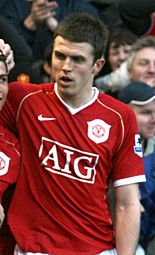
On July 28, 2006, Carrick officially joined Manchester United for £14 million. Manager Sir Alex Ferguson saw him as a key player to replace former captain Roy Keane. Carrick was given the number 16 shirt. He made his competitive debut for United on August 23, 2006.
Carrick scored his first Manchester United goal on January 13, 2007, in a 3–1 win against Aston Villa. He also scored his first FA Cup goal and two UEFA Champions League goals that season. His first season with United ended with them winning the Premier League title.
In October 2007, Carrick suffered an elbow injury but returned to action in November. He scored his first goal of the 2007–08 season in the Manchester derby. On May 21, 2008, he played in his first Champions League final in Moscow. United won 6–5 in a penalty shootout against Chelsea, with Carrick successfully converting his spot kick. This victory gave him his first European trophy.
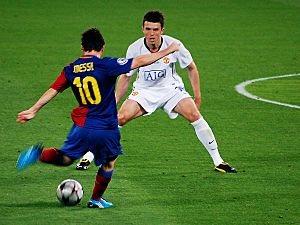
Carrick faced some injuries at the start of the 2008–09 season. However, he returned to score important goals, including a late winner against Wigan. This goal helped United secure their third consecutive Premier League title. On May 27, 2009, Carrick played in the 2009 UEFA Champions League final against Barcelona, which United lost 2–0.
In the 2009–10 season, Carrick scored his first Champions League goal against Wolfsburg. Due to many defensive injuries, Carrick even played as a centre-back, showing his versatility. Sir Alex Ferguson praised his contribution in this new role.
2010–2013: More Trophies and Recognition
Carrick scored his first League Cup goal in January 2010 against Manchester City. He played the entire game in the 2010 Football League Cup final, which United won 2–1, earning him his first League Cup medal. In March 2011, he signed a new three-year contract with the club.
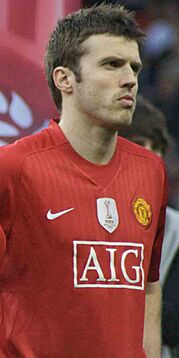
At the start of the 2011–12 season, Carrick made a surprise start in the 2011 FA Community Shield despite injury concerns. He scored his first goal in 70 games in December 2011. In January 2012, Carrick played his 250th match for Manchester United. He reached his 500th career match in February 2012 in a Europa League game against Ajax.
For the 2012–13 season, Carrick sometimes played as a temporary centre-back due to team injuries. He scored his first goal of the season in a Champions League victory against Galatasaray. In April 2013, Carrick was nominated for the PFA Player of the Year Award. He was also named Manchester United's Players' Player of the Year for that season. In November 2013, Carrick signed a contract extension until 2015.
2014–2018: Final Playing Years
In February 2014, Carrick faced some criticism from former captain Roy Keane. He then suffered an injury in July that kept him out for several weeks. Upon his return, he sometimes played as a centre-back again. In December 2014, Carrick was named Manchester United's new vice-captain.
On March 15, 2015, he scored his first goal in over a year during a 3–0 win against his former club Tottenham Hotspur. Five days later, Carrick signed a new one-year contract extension. He made his 400th Manchester United appearance on January 2, 2016. On May 21, he played in United's FA Cup win, completing his collection of every major domestic trophy in England. He signed another one-year contract extension in June 2016.
Carrick scored his first goal of the 2016–17 season in September. He became a key player for manager José Mourinho, who praised his ability to control the game. In May 2017, Carrick extended his contract until June 2018. He was granted a testimonial match in June 2017 to celebrate his 11 years of service to the club. After Wayne Rooney left, Carrick was appointed club captain in July 2017.
In November 2017, Carrick shared that he had experienced a health issue related to an irregular heart rhythm. He underwent successful medical treatment and returned to play. In January 2018, Carrick accepted an offer to join the club's coaching staff after his retirement at the end of the 2017–18 season. He played his 464th and final match for Manchester United on May 13, 2018, receiving a standing ovation from the fans.
International Career for England
Carrick played for the England under-18 and under-21 teams. He received his first call-up to the senior team in February 2001. He made his England debut in May 2001, replacing David Beckham in a friendly win against Mexico.
On May 8, 2006, Carrick was named in England's squad for the 2006 FIFA World Cup in Germany. He played one game in the tournament, a 1–0 victory against Ecuador. However, he was often overlooked for central midfield roles due to strong competition from players like Frank Lampard and Steven Gerrard.
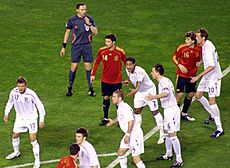
Carrick was named in England's squad for the 2010 FIFA World Cup in South Africa. He played in a warm-up friendly but remained an unused substitute during the main tournament. England was knocked out by Germany in the second round.
In May 2012, England manager Roy Hodgson explained that Carrick had previously expressed a desire not to be a "bit-part player." However, Carrick was recalled to the England squad in August 2012. He played the full 90 minutes in a 2–1 victory over Italy. He continued to feature in World Cup qualifiers, helping England qualify for the 2014 FIFA World Cup.
Carrick made his first appearance for England in 17 months in March 2015, starting in a 4–0 win against Lithuania. He made his 33rd appearance for the national team later that month in a friendly against Italy. In November 2015, Carrick suffered an ankle injury during a match against Spain, which was his last international appearance.
Coaching Career
Manchester United (First Coaching Role)
After retiring as a player, Carrick joined José Mourinho's coaching staff at Manchester United. When Mourinho was sacked in December 2018, Carrick briefly served as acting caretaker manager. He then remained on the coaching staff under new manager Ole Gunnar Solskjær.
On November 21, 2021, after Solskjær left his role, Carrick was named caretaker manager again. His first match in charge was a UEFA Champions League game against Villarreal, which United won 2–0. He also led the team to a 3–2 victory against Arsenal. On December 2, Carrick stepped down as first-team coach and left Manchester United. During his three matches as caretaker manager, he recorded two wins and one draw.
Middlesbrough Head Coach
On October 24, 2022, Carrick was appointed head coach of Championship club Middlesbrough. The team was 21st in the league when he took over. Despite losing his first game, Carrick quickly turned the team's fortunes around. He won 16 of his first 23 games, helping Middlesbrough climb the table.
He won the EFL Championship Manager of the Month award for March 2023. Carrick guided Middlesbrough to a fourth-place finish, but they lost in the play-off semi-finals. In his second season, Middlesbrough reached the semi-finals of the EFL Cup. On June 3, 2024, Carrick signed a new three-year contract. However, on June 4, 2025, Carrick was sacked by Middlesbrough after the team finished tenth in the league.
Return to Manchester United
Carrick returned to Manchester United on January 13, 2026, to take over as head coach until the end of the 2025–26 season. Just four days later, on January 17, he led the team to a 2–0 victory over Manchester City in the Manchester derby. This was United's first win over their rivals at Old Trafford since January 2023. He then won his second game in charge, a thrilling 3–2 victory against Arsenal on January 25. This earned United their 100th win over The Gunners and their first away league victory against their rivals since December 2017.
Player Profile: Style of Play
Carrick played as a deep-lying midfielder. He was not known for his speed or constant tackling. Instead, he used his intelligence and calm approach to read the game. He would cover space and make important interceptions to stop opposing attacks.
His excellent passing, vision, creativity, and ability to make plays were among the best in Europe. He could control the pace of the game and start his team's attacks. When he joined Manchester United in 2006, Carrick formed a strong partnership with Paul Scholes. Carrick played in a holding role, while Scholes helped create plays from deeper positions. This partnership helped Manchester United adopt a more European style of play, focusing on passing and keeping possession.
Personal Life
Carrick married Lisa Roughead, a Pilates instructor, on June 16, 2007. They have a daughter and a son.
In October 2018, Carrick shared his experience with mental well-being challenges. He spoke about facing difficulties after the 2009 UEFA Champions League final, hoping to help others who might be going through similar struggles. His younger brother, Graeme, also works in football coaching.
Career statistics
Club
| Club | Season | League | FA Cup | League Cup | Europe | Other | Total | |||||||
|---|---|---|---|---|---|---|---|---|---|---|---|---|---|---|
| Division | Apps | Goals | Apps | Goals | Apps | Goals | Apps | Goals | Apps | Goals | Apps | Goals | ||
| West Ham United | 1999–2000 | Premier League | 8 | 1 | 0 | 0 | 0 | 0 | 1 | 0 | — | 9 | 1 | |
| 2000–01 | Premier League | 33 | 1 | 4 | 0 | 4 | 0 | — | — | 41 | 1 | |||
| 2001–02 | Premier League | 30 | 2 | 1 | 0 | 1 | 0 | — | — | 32 | 2 | |||
| 2002–03 | Premier League | 30 | 1 | 2 | 0 | 2 | 0 | — | — | 34 | 1 | |||
| 2003–04 | First Division | 35 | 1 | 4 | 0 | 1 | 0 | — | 3 | 0 | 43 | 1 | ||
| Total | 136 | 6 | 11 | 0 | 8 | 0 | 1 | 0 | 3 | 0 | 159 | 6 | ||
| Swindon Town (loan) | 1999–2000 | First Division | 6 | 2 | 0 | 0 | — | — | — | 6 | 2 | |||
| Birmingham City (loan) | 1999–2000 | First Division | 2 | 0 | — | — | — | — | 2 | 0 | ||||
| Tottenham Hotspur | 2004–05 | Premier League | 29 | 0 | 6 | 0 | 3 | 0 | — | — | 38 | 0 | ||
| 2005–06 | Premier League | 35 | 2 | 1 | 0 | 1 | 0 | — | — | 37 | 2 | |||
| Total | 64 | 2 | 7 | 0 | 4 | 0 | — | — | 75 | 2 | ||||
| Manchester United | 2006–07 | Premier League | 33 | 3 | 7 | 1 | 0 | 0 | 12 | 2 | — | 52 | 6 | |
| 2007–08 | Premier League | 31 | 2 | 4 | 0 | 1 | 0 | 12 | 0 | 1 | 0 | 49 | 2 | |
| 2008–09 | Premier League | 28 | 4 | 3 | 0 | 1 | 0 | 9 | 0 | 2 | 0 | 43 | 4 | |
| 2009–10 | Premier League | 30 | 3 | 0 | 0 | 5 | 1 | 8 | 1 | 1 | 0 | 44 | 5 | |
| 2010–11 | Premier League | 28 | 0 | 3 | 0 | 1 | 0 | 11 | 0 | 1 | 0 | 44 | 0 | |
| 2011–12 | Premier League | 30 | 2 | 2 | 0 | 1 | 0 | 7 | 0 | 1 | 0 | 41 | 2 | |
| 2012–13 | Premier League | 36 | 1 | 5 | 0 | 0 | 0 | 5 | 1 | — | 46 | 2 | ||
| 2013–14 | Premier League | 29 | 1 | 0 | 0 | 3 | 0 | 7 | 0 | 1 | 0 | 40 | 1 | |
| 2014–15 | Premier League | 18 | 1 | 2 | 0 | 0 | 0 | — | — | 20 | 1 | |||
| 2015–16 | Premier League | 28 | 0 | 5 | 0 | 1 | 0 | 8 | 0 | — | 42 | 0 | ||
| 2016–17 | Premier League | 23 | 0 | 2 | 0 | 5 | 1 | 7 | 0 | 1 | 0 | 38 | 1 | |
| 2017–18 | Premier League | 2 | 0 | 2 | 0 | 1 | 0 | 0 | 0 | 0 | 0 | 5 | 0 | |
| Total | 316 | 17 | 35 | 1 | 19 | 2 | 86 | 4 | 8 | 0 | 464 | 24 | ||
| Career total | 524 | 27 | 53 | 1 | 31 | 2 | 87 | 4 | 11 | 0 | 706 | 34 | ||
International
| National team | Year | Apps | Goals |
|---|---|---|---|
| England | 2001 | 2 | 0 |
| 2002 | 0 | 0 | |
| 2003 | 0 | 0 | |
| 2004 | 0 | 0 | |
| 2005 | 2 | 0 | |
| 2006 | 7 | 0 | |
| 2007 | 3 | 0 | |
| 2008 | 1 | 0 | |
| 2009 | 5 | 0 | |
| 2010 | 2 | 0 | |
| 2011 | 0 | 0 | |
| 2012 | 4 | 0 | |
| 2013 | 5 | 0 | |
| 2014 | 0 | 0 | |
| 2015 | 3 | 0 | |
| Total | 34 | 0 | |
Managerial statistics
| Team | From | To | Record | ||||
|---|---|---|---|---|---|---|---|
| G | W | D | L | Win % | |||
| Manchester United (caretaker) | 21 November 2021 | 2 December 2021 | 3 | 2 | 1 | 0 | 66.67 |
| Middlesbrough | 24 October 2022 | 4 June 2025 | 136 | 63 | 24 | 49 | 46.32 |
| Manchester United | 13 January 2026 | Present | 2 | 2 | 0 | 0 | 100.00 |
| Career total | 141 | 67 | 25 | 49 | 47.52 | ||
Honours
As a player
West Ham United U18
- FA Youth Cup: 1998–99
West Ham United
- UEFA Intertoto Cup: 1999
Manchester United
- Premier League: 2006–07, 2007–08, 2008–09, 2010–11, 2012–13
- FA Cup: 2015–16
- Football League/EFL Cup: 2008–09, 2009–10, 2016–17
- FA Community Shield: 2007, 2008, 2010, 2011, 2013, 2016
- UEFA Champions League: 2007–08
- UEFA Europa League: 2016–17
- FIFA Club World Cup: 2008
Individual
- PFA Team of the Year: 2003–04 First Division, 2012–13 Premier League
- Manchester United Players' Player of the Year: 2012–13
As a manager
Individual
- EFL Championship Manager of the Month: March 2023
See also
 In Spanish: Michael Carrick para niños
In Spanish: Michael Carrick para niños
 | Aurelia Browder |
 | Nannie Helen Burroughs |
 | Michelle Alexander |


